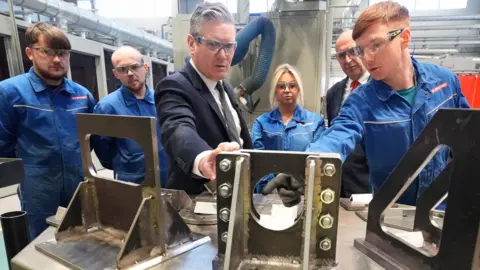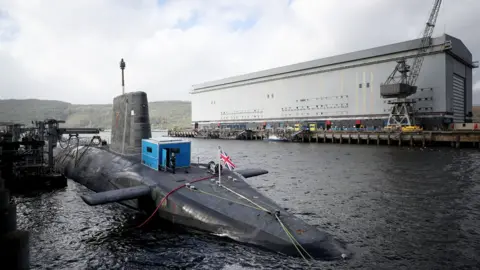Keir Starmer: Labour commitment to nuclear weapons unshakeable
 PA Media
PA MediaSir Keir Starmer has said his commitment to the UK's nuclear weapons is "unshakeable" and "absolute".
Writing in the Daily Mail, he described the creation of the NHS and an independent British nuclear programme as "towering achievements" of the Labour government elected in 1945.
The Labour leader has also said he wants to raise defence spending to 2.5% of GDP "as soon as resources allow".
The government plans to spend 2.3% of GDP on defence this year.
Chancellor Jeremy Hunt has also said he wants the figure to rise to 2.5% "as soon as economic conditions allow", but neither party has set out a timeline for this.
Earlier this year, two ministers - Tom Tugendhat and Anne-Marie Trevelyan - publicly urged the government to invest in defence at a "much greater pace".
Defence Secretary Grant Shapps said Labour could not "be trusted with our nation's defences" because Sir Keir had "tried twice to put Jeremy Corbyn in charge of the nation's armed forces".
"The same man who wanted to scrap our nuclear deterrent, dismantle Nato and questioned the integrity of British intelligence community," he added.
Neither Sir Keir's pledge on the UK's Trident nuclear weapons nor his aspiration to increase defence spending were "credible", Mr Shapps claimed, as 11 members of the Labour leader's team - including deputy leader Angela Rayner and shadow foreign secretary David Lammy - had voted against renewing Trident in 2016.
He accused Sir Keir of "saying whatever he needs to, to get your vote".
Since the United States dropped atomic bombs on Hiroshima and Nagasaki in 1945, Labour has often been divided on nuclear weapons - and the related issue of multilateral versus unilateral disarmament - not least during the leadership of Sir Keir's predecessor, Jeremy Corbyn.
Clement Attlee, who was prime minister from 1945-1951, is widely revered in the party as the father of the NHS and much of the rest of the welfare state.
But he was also the father of Britain's nuclear bomb, ensuring the UK got its own "nuclear deterrent" and committing many millions of pounds to its development at a time when the country was technically bankrupt.
His foreign secretary, Ernest Bevin, was a key figure in the establishment of the Nato alliance.
In his Mail article, Sir Keir emphasised these points, calling them a "proud part of my party's heritage".
Visiting the BAE Systems shipyard in Barrow-in-Furness in Cumbria, where the UK's nuclear submarines are built, the Labour leader said his party was making a "generational commitment".
This was "to the Dreadnought submarines, to the continuous at-sea deterrent, and to the upgrades that are needed over time. And of course there's AUKUS in there as well," he added.
AUKUS is the security pact agreed by the UK. the US and Australia to counter China's ambitions in the Indo-Pacific region.
Last October, BAE Systems secured a £3.95bn contract to build a new generation of nuclear-powered attack submarines as part of the pact.
The UK's four nuclear-armed Vanguard submarines that carry Trident missiles are housed in the west of Scotland.
Earlier, when asked about defence spending in an interview with the i newspaper, Sir Keir said he would conduct a strategic review "to be clear what the priorities are".
But, he added: "In the face of rising global threats and growing Russian aggression, the UK's nuclear deterrent is the bedrock of Labour's plan to keep Britain safe.
 PA Media
PA Media"It will ensure vital protection for the UK and our Nato allies in the years ahead, as well as supporting thousands of high-paying jobs across the UK."
He also stressed his party had "changed" - a reference to Mr Corbyn, a long-time opponent of the UK's Trident missile system and vice-president of the Campaign for Nuclear Disarmament (CND).
Nuclear weapons were "expensive but it's absolutely vital and needed", Sir Keir said.
Annual running costs are estimated at 6% of the defence budget - about £3bn in 2023-24. The new Dreadnought boats being built at Barrow-in-Furness to replace the current submarines in the early 2030s carry an estimated cost of £31bn.
'Meaningless'
Left-wing group, Momentum, which backed Mr Corbyn, condemned Sir Keir's priorities.
Co-chair Hilary Schan said: "For months we have been told by the Labour leadership that there's simply no money left: no money to scrap the two-child benefit cap, no money to introduce universal free school meals, no money to invest in our public services or the green transition.
"Yet at a stroke Keir Starmer has today made a massive, permanent spending commitment. This shows that Labour can and should make different economic choices."
Liberal Democrat leader Sir Ed Davey attacked both Labour and the Conservatives for offering "only meaningless talk about vague aspirations for some unspecified time in the future".
SNP defence spokesperson Martin Docherty-Hughes MP - whose party opposes Trident - said Westminster had "already wasted billions of pounds of taxpayers' money on nuclear weapons".
It was "grotesque that Sir Keir Starmer is prepared to throw billions more down the drain when his party claim there is no money to improve our NHS, help families with the cost of living or to properly invest in our green energy future", he added.
All members of Nato have pledged to spend at least 2% per year of the total value of their economies - measured by GDP (Gross Domestic Product) - on defence by 2024.
According to the Nato secretary general's annual report, Poland was the top spender by GDP last year, allocating 3.9% to defence, followed by the US at 3.2%.